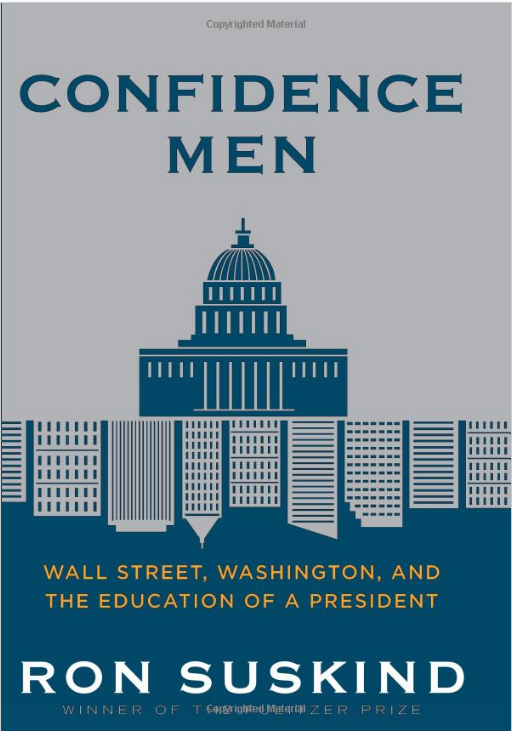Book Report by George Kennedy

A trenchant work by a Pulitzer Prize-winning author; timely, serious, excruciatingly detailed, and well worth the time investment for any keen observer of the Obama Administration.
I have read other books covering the Obama Administration but, Suskind offers us an extraordinary, fly-on-the-wall perspective on very intimate policy discussions among the President’s inner circle.
For example, some of the comments (“no one is in charge”) attributed to Larry Summers; the head of the National Economic Council are highly personal and do, in my view, represent insubordination.
The Treasury Secretary should have had a shorter tether to his Wall Street patrons.
The President is portrayed as having been practically mesmerized by the brilliance of those he chose as his early team of senior advisors rather than prescient enough to have selected those most committed to his policy goals given the tenor of the times.
I will not wade into the debate surrounding the possibility some of the conversations between the White House Chief of Staff, the Treasury Secretary, and the head of the National Economic Council may be partly fictionalized. “Confidence Men” is in the public domain and it will influence attitudes and condition political reflexes toward the President, his White House, and his Democratic allies in Congress.
At a minimum, it will embolden his Republican critics in both Houses of Congress and will certainly sharpen the attacks from contenders for the Republican presidential nomination.
On an emotional level, I ranged from surprise, to frustration, to outright anger while reading “Confidence Men.” On several occasions, I had to set the book aside momentarily and ask myself, “How could Obama have been so supremely naïve yet equally self confident?” Former Fed Chairman Paul Volcker is reported to have wondered aloud about the source of the President’s self confidence. As an aside, I also wondered if on a philosophical level, the President felt comfortable as a Democrat or perhaps he was an Eisenhower Republican caught in a time warp.
This review has taken on the tone of opinion more than review – and that’s fair. My intent is to encourage you to read the book. Like many these days, I do have developed opinions of the President and Suskind has done a remarkable job of framing some of them for me. Hence, opinion commingled with review.
From my distant perch, I concluded early in his presidency that Obama’s failure to understand the importance of framing and controlling his own narrative was to be his Achilles Heel. The perfect example was the health care debate. The author succinctly expresses my take on Obama by the summer of 2009 when he writes “grasping policy options had never been difficult for Obama. It was about leadership – and how he could wrangle the mighty beast of American business.”
Page 445: My indictment of this President, above all else, is a failure to lead. Several of my blog posts at WhoShapesOurtimes.com/Politics are devoted to weak leadership. As Suskind further notes, “the presidency occupies a space that Obama was reluctant to fill – until after the 2010 elections.”
Was Obama that insecure? By then, the second summer of his presidency, the Republicans, fortified by an emerging and highly vocal and critical Tea Party, had seized the political narrative downplaying White House legislative successes and highlighting their portrait of the President as the accidental president – out of his depth and an enemy of the “American people.”
Suskind opines that “Obama arrived with too much faith in intellect’s power – with the idea that a collection of smartest people kept in one room could solve almost any problem.” In time, the President learned otherwise – but was it too late?
The frustration, the outrage Democrats, independents, and other elements of the President’s base openly expressed – and equally rebuffed by Obama – is justified, in my view, because the President’s decision making was apparently characterized by a constant search for “the perfect technical answer to each item on a very full plate of complexity – such as job creation, or financial restructuring, or even healthcare.” (Page 468).
It was painful to accompany this President on his journey to discover one of Washington’s more sobering truths: the nation’s capitol is “still a town where public purpose rarely managed to outrun private gain.”
The opportunities for true greatness, to respond to history’s call to arms, were handed to the President but other instincts, fear, or the influence of his most senior advisors always prevailed – at least until 2010.
A lack of experience and a preference for his Treasury Secretary’s “Hippocratic risk assessment” (first, do no harm – to Wall Street, the insurance industry) diminished Obama’s prospects for the greatness he felt was his destiny.
Wall Street, on the other hand, mocked Hippocrates since “doing harm is its business.” Doing harm then, was profitable since key parts of the economy were overwrought and it was those parts that were the focus for Wall Street outsized profits.
A theme I detected throughout Suskind’s book – at least for the first two years of the Obama presidency – is that of a President disconnected from the realities of governing, the necessity to understand and remain connected to currents of opinion – especially within his base. Obama did not intuitively grasp there were consequences for what he did, how he did it, and how the two could undermine confidence in his leadership.
The outcome of the 2010 elections brought the President down from his “historic highs to crushing defeat in just two short years.”
From then on, it was an open agenda with a President on the defensive and the Republicans openly relishing the possibility he could be overwhelmed in 2012. In the end, the author leaves us hopeful that a chastened President finally gets it.
During an interview with Obama, the President is quoted as having said “this job is not just getting the policy right. It’s about getting the American people to believe in themselves, and in our capacity to act collectively to deliver for the next generation…that leadership in this office is not a matter of you being confident. Leadership in this office is a matter of helping the American people feel confident.” Hear! Hear!
A great read. Pick it up. Make the journey with the President before rendering your final verdict.
